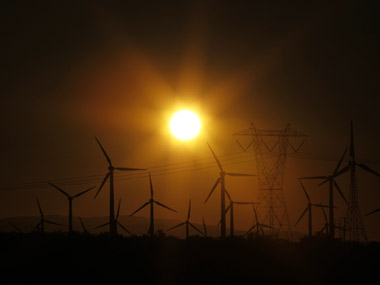By Arjun Parthasarathy
The recent announcements by the Swiss and German governments to phase out their nuclear power stations can give a fresh thrust to green energy producers. The Swiss government has decided to shut down five nuclear plants that contribute to 40 percent of the country’s energy requirements. The German government has decided to shut down all its nuclear power plants by 2022. Nuclear power meets 22 percent of Germany’s energy requirements.
The decisions of these two countries to shut down nuclear power plants come in the wake of the Japanese Fukushima disaster where an earthquake led to a couple of nuclear power plants being damaged, leading to leakages and radiation worries. The Japanese government is also committed to reducing its dependence on nuclear energy in a decade.
[caption id=“attachment_20224” align=“alignleft” width=“380” caption=“Green energy technology, which harvests solar and wind energy, is a sunrise industry. Lucy Nicholson / Reuters”]
 [/caption]
[/caption]
The loss of power from nuclear technology will be replaced by green energy sources. The governments in question have committed to increasing green energy’s share in total power generation. This brings green energy in focus and companies that can produce green energy on a large scale at reasonable cost can do well in the future.
There are nine different sources of green energy, each having its pros and cons. Green energy sources include tidal power, wave power, solar power, wind power, hydro-electricity, radiant energy, geothermal power, biomass and CNG (compressed natural gas). Nuclear power ironically is also listed as a green energy source but the pitfalls and risks are too many, as seen in the case of Japan.
Impact Shorts
More ShortsGreen energy as a concept is not new. There are many companies in India that are in the green energy space. Suzlon in wind energy, Orient Green Power in wind and biomass energy, Tata BP Solar and Moser Baer in the solar energy space, and Suryachakra Power are companies that come to mind.
There have been many companies that have tried their hand at green power and have not succeeded. Hence even if green energy is in focus, it is not necessary that all companies will do well. Suzlon, for example, has lost more than 80 percent of its market capitalisation due to high debts and delivery issues.
Investors, however, should keep their eyes on green energy companies. The world’s focus will shift to green energy if more and more countries opt to go the Switzerland and Germany way. This will give rise to technology, manufacturing and service opportunities for companies already existing in the green energy space or new companies looking to set up shop to cater to green energy demand. The focus on green energy may also lead to a speculative bubble in many green stocks. Investors can make good returns if they catch the bubble early and exit when the bubble is close to its peak. Investors should also be careful of fly-by-night operators who will join the fray for a quick killing. Do not be surprised if every energy company adds a green tag to itself.
Look to see if a bubble starts to form in green energy. If it does start to form, ride it and get out when the going is good.
www.arjunparthasarathy.com)